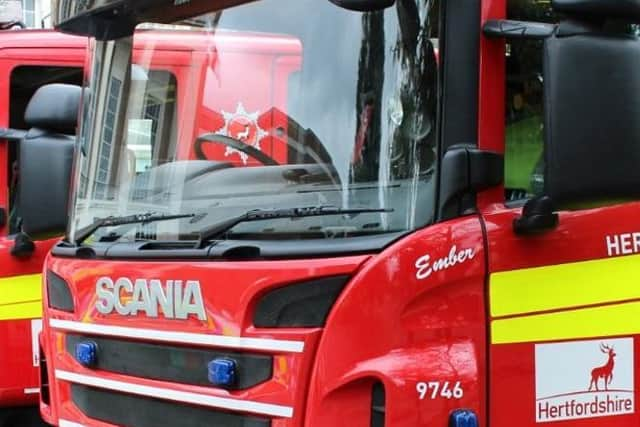Hertfordshire Fire and Rescue get the go-ahead for trial to limit fire response to automated alarms
and live on Freeview channel 276
Hertfordshire Fire and Rescue Service has been given the green light for a trial that will limit attendance at automated fire alarms at offices and shops.
Fire crews turned out to more than 850 automated alarms at shops or offices in the county over the past three years.
Advertisement
Hide AdAdvertisement
Hide AdBut on just SEVEN of those occasions – that’s less than one per cent – was there a fire.


As part of the trial, crews will only turn out to automated alarms at shops or offices AFTER there has been further confirmation of a fire.
And bosses hope that the additional confirmation will slash the number of false alarms attended – ensuring crews are available for emergencies or for community safety work.
The approach was backed by a meeting of the county council’s community safety and waste management cabinet panel last week.
Advertisement
Hide AdAdvertisement
Hide AdOn Monday, November 23, it was given the go-ahead by a meeting of the cabinet. And it is expected to start in 2021.
The fire service does already insist on independent confirmation of a fire identified by automated alarm at a shop or office, between 7am and 7pm.
But the trial will see same approach extended to 24 hours a day – although it will NOT apply to premises attached or adjacent to residential properties.
Proposing the trial to the cabinet, executive member for community safety and waste management Cllr Terry Hone said the fire service had responded to 3300 automated alarms at ‘non-domestic’ properties over the past three years.
Advertisement
Hide AdAdvertisement
Hide AdHe said offices and retail premises had accounted for 26 per cent – that’s equivalent to around one in every four – of those calls.
But, he said, just seven – four to retail premises and three to offices – were as a result of a fire.
And none, he said, had required a hose reel or breathing apparatus – “suggesting that these were relatively minor incidents” – and no-one was injured.
“Sending fire appliances and firefighters to these sorts of instances does mean they are not available for use in the a real emergencies that may or may not occur,” he said.
Advertisement
Hide AdAdvertisement
Hide Ad“And that is our preference – to have them available for these sorts of services.
Cllr Hone said there would be “limited exceptions” to the trial policy, according to risk – pointing to sleeping accommodation, residential or high risk premises are connected or adjacent to offices or retail premises.
And he stressed that residential properties – including hospitals, care homes, HMOs, high rise residential properties, hostels – would also be exempt from such an approach.
He said a number of other fire authorities already took a similar approach – and he stressed it was not designed to cut costs.
Advertisement
Hide AdAdvertisement
Hide Ad“It’s important that these proposals are not financially driven – but are all about making more efficient use of our resources by reducing the number of false alarms attended by whole time firefighters,” he said.
“These resources can be redeployed to support community safety activities, training and may be available to attend incident that do require attendance.”
Meanwhile leader of the council Cllr David Williams stressed that this was a trial and that there would be some further contact with relevant businesses.
“I think the important thing to highlight here is that this is a trial,” he said.
Advertisement
Hide AdAdvertisement
Hide Ad“There will be that consultation with businesses that are linked to alarm centres and also we need to recognise that this is something which a number of other large fire and rescue services have already implemented.”